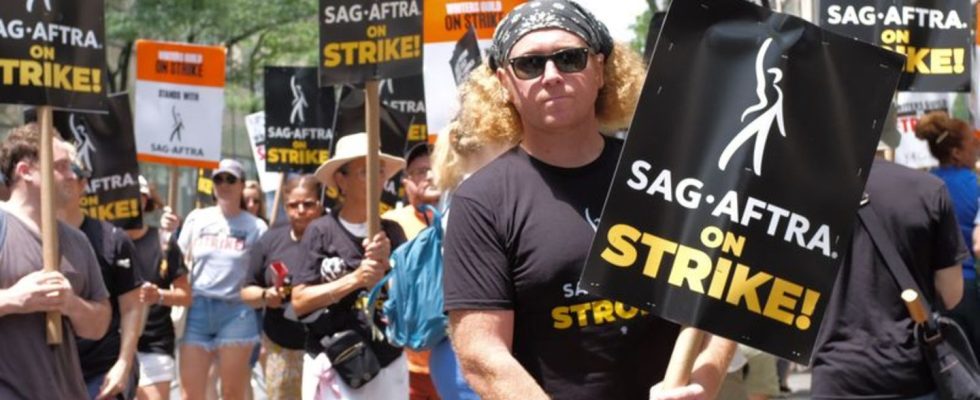From Los Angeles to New York, actors and screenwriters are striking for better wages and AI regulation. Filming is on hold. And a premiere in Berlin has to do without stars.
Linda Powell is among the first to arrive outside the New York headquarters of streaming giant Netflix on Broadway near Union Square on a muggy Friday morning. The actress does not want to be photographed, she does speak. She is one of the members of the actors’ union SAG-AFTRA who has been on strike since midnight – the negotiations with the association of TV and film studios AMPTP about better remuneration and regulating the use of artificial intelligence (AI) had previously failed.
“I was hoping that the writers’ strike would put enough pressure on the writers,” says Powell, who was at the negotiating table. “That was not the case”. Now the union is mobilizing for a strike: not only in Los Angeles, but also in other important locations for the US film industry, including New York and Atlanta in the state of Georgia.
Effects
It is the first double strike by actors and screenwriters in the United States in more than 60 years. Operations across the country are likely to be idle indefinitely. The strike is binding in front of and behind the camera, at least for all unionized actors in SAG-AFTRA, which has more than 160,000 members. Its members include stunt people and TV journalists.
Filming on numerous films has been halted, including “Deadpool 3” and the “Gladiator” sequel. A number of series are also affected. In addition, union members are no longer allowed to advertise their work. The German premiere of “Barbie” on Saturday had to do without stars. Leading actress Margot Robbie, her male counterpart Ryan Gosling and co-stars America Ferrera, Issa Rae and Simu Liu canceled their visit to Berlin.
Although many Hollywood stars give the labor dispute prominent reach, above all union president Fran Drescher (“The Nanny”), it is essentially about all those who earn their living with smaller supporting roles or as extras. SAG-AFTRA members qualify for union health insurance with an annual income of $26,000 or more. However, the majority has not reached this limit for a long time.
causes
According to the strikers, the culprit is the market dominance of streaming services such as Netflix and Amazon Prime Video, whose business model – unlike that of the television stations – only provides for very low royalties. “Royalty paid once,” says Powell, who plays a fictional US Secretary of State in three episodes of the Netflix series House of Cards. “A lot of people think we’re all stars, but we’re fighting here for those who are just making ends meet.”
A little further north, in front of the NBC headquarters at Rockefeller Center, an employee of the in-house security company is trying to keep around 50 strikers and the press present in an area fenced off especially for the strike. Amid the hustle and bustle, Keith Fennelly takes a quick breather. Payment is one thing, explains the prop master, who works in solidarity with his fellow actors (“The Marvelous Mrs. Maisel”, “Billions”). But he is also “about dignity and the craft as an artist”. He is referring to the rise of AI.
Artificial intelligence
While increasingly intelligent chatbots like ChatGPT leave writers in fear for their jobs, actors also fear that AI could use their likeness, voice or performances without consent or compensation. “It’s so inhuman,” says Fennelly, adding, “This is a fight like never before.”
In the midday heat on Times Square, a well-known street performer also joined this fight: the naked cowboy accompanied the strikers musically on the guitar. Surprised tourists turn around and take photos. “Stand up, fight back,” sings the scantily clad man in a USA-style cowboy hat and boots, whose real name is Robert John Burck.
The naked cowboy next to strikers: It is a symbolic image of this dispute, in which much anger is directed at the managing directors and board members of the largest US media groups. Shortly before the talks broke down, Disney CEO Bob Iger described the union’s demands on US television broadcaster CNBC as “not realistic” and warned of the collateral damage of a strike. “Due to the sheer size of the industry,” this “would have an impact on the economy of various regions,” said Iger. And: “It’s a shame, it’s really a shame.”
According to many union members, Iger and others have lost touch with the everyday lives of average earners. “You can’t expect someone who makes more than $20 million a year and owns multiple homes to understand what it’s like to struggle with $26,000,” actor Mehdi Barakchian said over the phone about his protest in front of the Disney headquarters in Burbank, California.
He is particularly bothered by the fact that viewer data for streaming services is kept strictly under lock and key. A requirement of SAG-AFTRA is therefore also to hire an external data company to implement a model for royalties based on the streaming success of films and series. “They take the work that we did, it gets millions of views,” laments Barakchian, who plays a “middle-aged man from Brooklyn” in the first scene of the Netflix hit You. “And then we get paid as if it was only used once.”
Despite the lack of payments due to the strike, Barakchian attests that the protest has lasted for a long time: “They think that it’s only now hurting us. But the reality is: we’ve been doing badly for years.”

